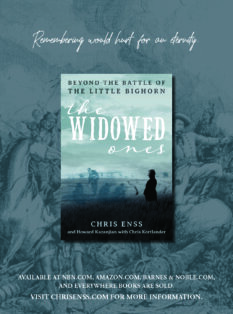“A poignant biography of the survivors of Little Bighorn, a new collection of short stories, a biography of a Chinese frontier leader, a history of a new people of the West and a stark Western tale.” True West Magazine

Over the past two decades, Western Writers of America President Emeritus Chris Enss has established herself as one of the preeminent authors of Western women’s history. Her most recent, The Widowed Ones: Beyond the Battle of the Little Bighorn (TwoDot, $26.95), sets a new standard for Western researchers seeking a greater understanding of the stories of survivors of war, epidemics and natural disasters in the post-Columbian era of the Western United States. Written with her longtime collaborator Howard Kazanjian and Chris Kortlander, a noted collector of George Armstrong and Elizabeth “Libbie” Bacon Custer primary materials, Enss’s book places the reader into the storyline of the lives of the 7th Cavalry officers and their ignoble leader Lt. Col. Custer just after the Battle of Little Bighorn. The authors’ narrative recounts the story of the widows of the seven married officers, before, during and after the battle—and how each of their lives were fated to be assigned to Custer’s 7th Cavalry at Fort Lincoln, Dakota Territory. At the center of the seven-decade chronicle is Libbie Custer, the acknowledged leader of the 7th Cavalry’s officers’ wives, a role she would hold until her passing in 1933. As the authors note, until her final breath four days before her 91st birthday, Libbie championed her late husband and lived her life as positively as possible in support of herself and those who survived those killed at Little Bighorn on June 25, 1876.
I particularly like The Widowed Ones for its expansion of our understanding of the well-chronicled Battle of Little Bighorn and the leadership of both the American and Indian allies and enemies of the Great Sioux War of 1876. I have thought for many years that historians of post-Civil War America still have a lot of material to quantify and qualify related to the aftermath and long-term effects of the violence meted out and absorbed by so many Americans of all ethnicities, races and religions. The post-traumatic effects of the War Between the States, which contributed to the frontier violence between settlers, Native peoples and the American military, also affected subsequent generations, especially those who had family killed or maimed in conflict during the settlement of the Western half the United States after 1865.
Enss’ next book, Along Came a Cowgirl: Daring and Iconic Women of Rodeos and Wild West Shows (TwoDot), will be on shelves in September 2022, but I believe she will be willing to shed tears on the page to write the stories of more women and their children, whose voices have been rarely or never heard before.
—Stuart Rosebrook

